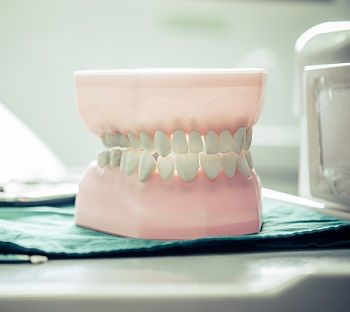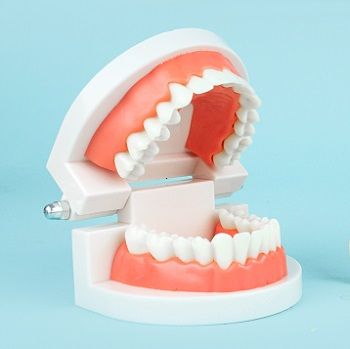How to care for dentures?
Dental Implants Solutions
Dentures have been around for centuries, providing a solution for people who have lost some or all of their natural teeth. Whether you're missing teeth due to injury, decay, or simply old age, dentures can help you regain your confident smile and improve your oral function. But what exactly are dentures, and how do they work? So, if you're considering dentures to replace your missing teeth, read on to find out more! In this blog, we'll delve into the world of dentures and explore what they are, how they benefit you, and how you can care for them.
What are dentures?
Dentures are prosthetic devices used to replace missing natural teeth and gums. They improve the appearance and function of a person's smile and aid in biting, chewing, and speaking. They typically come in acrylic resin or a combination of acrylic and metal and are custom-fit to an individual's mouth. Dentures can be full or partial, depending on the number of teeth missing, and can be removable for cleaning or maintenance.

Types of dentures
Complete Dentures: Complete dentures, also known as full dentures, are used when all natural teeth are missing. They come in a plastic base with artificial teeth that fit over the gums. Complete dentures can be either traditional or immediate. Traditional full dentures are made after the remaining natural teeth have been removed and the gums have healed, which can take several months. Immediate complete dentures are made in advance and can be inserted immediately after removing natural teeth, avoiding the need to be without teeth during the healing period.
Partial Dentures: Dentists recommend partial dentures when some of your natural teeth remain. They fill in the gaps due to missing teeth and are held in place by clasps that attach to the remaining natural teeth. Partial dentures come in metal or plastic and can be removable or fixed.
Immediate Dentures: Immediate dentures are complete ones that your dentist creates in advance and inserts immediately after removing natural teeth. The advantage of immediate dentures is that you do not have to go without teeth during the healing period. However, the disadvantage is that immediate dentures may need adjustments or replacement after healing. Because the gums and bones can shrink, it affects the denture's fit.
Overdentures: Overdentures are dentures that fit over remaining natural teeth or dental implants. They are designed to provide stability and support for the denture and can improve chewing function. Overdentures can be either removable or fixed in place.
Hybrid Dentures: Hybrid dentures combine a fixed dental bridge and a removable denture. They are attached to dental implants and offer the stability of a fixed bridge with the removable convenience of a denture. Hybrid dentures are a good option for people who want a permanent solution but also want the opportunity to remove their teeth for cleaning or repair.
How should I care for my dentures?
Proper care is essential to maintain dentures' appearance, fit, and function. Here are some more detailed tips on how to care for dentures:
Clean Dentures Daily: Brush dentures using a soft-bristled brush and a mild soap or denture cleaner. Gently scrub all surfaces, including the chewing and inside areas where the dentures come in contact with the gums. Rinse dentures thoroughly under running water to remove all soap and debris. Avoid using abrasive cleaners or brushing too hard, as this may scratch or damage dentures.
Handle with Care: When handling dentures, it is essential to be gentle to avoid bending or cracking them. Hold dentures over a soft surface, such as a towel or a water basin, in case they slip. Do not drop dentures or leave them in a hot or humid place, as this may cause them to warp or become deformed.
Soak Dentures: You must soak your dentures in water or a denture-soaking solution when not in use to keep them from drying out. This will also help remove any stains or debris that may have accumulated on the dentures. Soaking solutions are available in most drugstores and can help kill bacteria and freshen dentures.
Store Dentures Safely: When not in use, store dentures in a safe place to avoid damage. You should store your dentures in a container filled with water or a denture-soaking solution to prevent them from drying. Do not store dentures in a hot or humid place, as this may cause them to warp or become deformed.
Check for Fit: Dentures may become loose over time, affecting their fit and comfort. Loose dentures can cause discomfort and lead to other oral health problems, such as gum irritation or infection. If dentures are loose, it is essential to consult a dentist as soon as possible to have them adjusted or refitted.
Replace Dentures: You should replace them when they no longer fit properly, become worn, or are beyond repair. Replacing dentures regularly will ensure they are comfortable, functional, and aesthetically pleasing. A dentist can help determine if it is time to replace dentures and recommend options for new dentures.
Maintain Good Oral Hygiene: It is essential to maintain good oral hygiene even if wearing dentures. Brush the gums, tongue, and roof of the mouth each morning with a soft-bristled brush and clean dentures before putting them back in the mouth. This will help to remove bacteria and freshen the breath.
By following these tips, you can ensure that you maintain your dentures well, comfortably, and functioning correctly. If there are any issues or concerns with dentures, it is best to consult a dentist for advice.

What are the benefits of dentures?
Here are the main benefits of dentures:
Improved appearance: Dentures can help restore the appearance of a smile by replacing missing teeth and giving the face a more youthful look.
Better chewing ability: Dentures can help improve chewing ability and make it easier to eat various foods.
Improved speech: Missing teeth can affect speech, but dentures can help restore proper speech patterns.
Better oral health: Dentures can help prevent oral health problems by distributing bite pressure evenly. It avoids pressure concentration in one area and reduces the risk of tooth damage or jaw pain.
Increased confidence: Many people who wear dentures feel a boost in confidence and self-esteem because they can smile, speak, and eat comfortably.
Cost-effective: Dentures are a cost-effective way to replace missing teeth compared to other tooth replacement options, such as dental implants.
Convenient: Dentures are easy to clean and maintain and can be removable for cleaning or repair if necessary.
Conclusion
In conclusion, dentures are a popular and cost-effective option for replacing missing teeth. They offer many benefits, including improved appearance, chewing ability, speech, oral health, increased confidence, and convenience. Dentures can provide many years of functional and aesthetic benefits with proper care and maintenance. To maintain the longevity and function of dentures, it's essential to practice good oral hygiene. Moreover, follow your dentists' instructions for cleaning, and see a dentist regularly for check-ups and adjustments.
Contact your dentist in Walnut Creek, Massood Darvishzadeh, DDS, at Dental Implant Solutions to know more about dentures.
Resource:
What Is The Procedure For Dentures
*This media/content or any other on this website does not prescribe, recommend, or prevent any treatment or procedure. Therefore, we highly recommend that you get the advice of a qualified dentist or other medical practitioners regarding your specific dental condition*
Subscribe To Our Newsletter
Get Updates And Learn From The Best
More To Explore



CONTACT US
Massood Darvishzadeh, DDS
2021 Mt Diablo Blvd., Suite 100A
Walnut Creek, CA 94596
(925) 939-2600info@dentalimplantsolutions.net